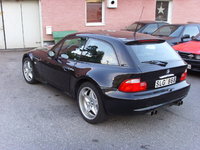timing chain snapped on 1999 2.8 z3 is this a conflict engine
Asked by sparky1960 Nov 24, 2012 at 05:41 AM about the 1999 BMW Z3 2.8 Roadster RWD
Question type: General
11 Answers
What do you mean by 'conflict engine?' Do you mean an engine that when the timing belt breaks the piston will hit a valve? I need to research that, if that's what you mean.
Yep, it's a no tolerance, if the piston comes up for a compression or exhaust stroke when a valve is open, which they are not supposed to be whenever the piston is at TDC they should be closed, and good-bye to top end
How does a timing chain break?! Belts go, but I've never seen a chain fail...
Colin I had a roller-chain stretch--- and cause my old 390 in my 1978 truck to jump time, but it didn't break, new chain, simple job of lining up the marks, good to go
It is an interference engine indeed, if the chain snaps or jumps one too many teeth you can kiss the valves goodbye (and potentially a couple of pistons and the head too). I have seen a few chains break in my time, but nowhere near as many as I have seen timing belts fail.
Use the best engine oil to prevent wear in your engine, including timing chains.. Many car makers are recommending synthetic oil now. I've been using Mobil One Extended Performance oil for many years with no engine problems.
hmmm, i also own a 6cyl Z3.... this is an interesting post for me personally; i hope something similar doesn't happen to my while on a long drive in the countryside.... usually, chain running BMW's are very sturdy....
sparky1960 answered 11 years ago
recommend you change it before 100000 miles and only use fully synthetic oil
Stick to fully synthetic oil that meets BMW LL-04 specification and replace it on the specified interval. No need to change the chain really, they hardly ever fail, and most times that's due to poor maintenance (i.e. skipping oil changes). Replacing the timing chains (yes, there are two: one from the crankshaft to the right hand camshaft and another connecting the twin camshafts) is very labour intensive, it pretty much requires you to tear down the entire engine. You're probably going to be cheaper off getting a used engine than paying for a dealer to replace the chains. DIY'ing a job like that is more than the home mechanic can do, the special tools required are tough to get a hold of.
'd like to bring attention to something Lars said. FULLY SYNTHETIC. Many motor oils on the shelf are labeled 'synthetic' and are actually blends of petroleum and synthetics. Fully synthetic oil was developed by the US Air Force during WWII to tolerate the heat, especially in jet engine helicopters, ramjet, turboprop and turbojet fighters, transports, and others. The US Navy had an engineer there, to give credit where credit is due. But the Nazi engineers developed a synthetic about the same time but inferior. Ya gotta read the label folks, and to simplify everything just use Mobil1...and @sparky, you DO mean 10,000 not 100k , right? and @ Jimmy..not usually. always
Quite right David, never use a semi-synthetic oil in a car designed to use fully synthetic unless you greatly reduce the replacement interval and stick to the same viscosity. Full synthetics are more resistant to temperature wear and better at removing deposits for a longer time. On top of that all: don't bother wasting money on oil additives, it's like adding sugar to your can of coke...
